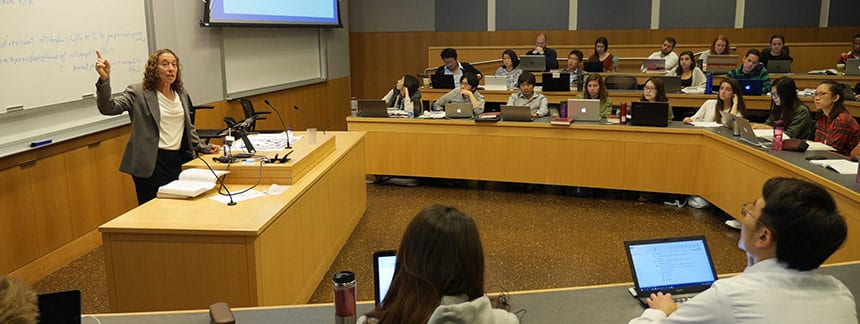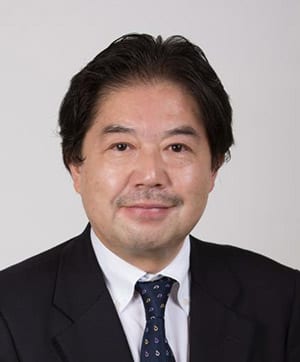
By Andrew Cohen
Selling Professor Jill Fisch on a year at Berkeley Law wasn’t exactly difficult. “I have a lot of friends, colleagues and former colleagues here,” she said. “It’s a dynamic environment both in terms of research and the growing interest in business law.”
Fisch is one of six visiting professors at the school this semester. “One of the wonderful advantages we have as a law school is our ability to attract superb visitors from around the world and from other schools here in the Bay Area,” said Professor Mark Gergen, Berkeley Law’s associate dean for faculty development and research. “They teach both basic and specialized courses across our entire curriculum, participate in our workshops, often present papers and sometimes collaborate with our permanent faculty.”
A renowned scholar and educator at the University of Pennsylvania Law School, where she co-directs its Institute for Law & Economics, Fisch is teaching Business Associations this semester. Judging from the enrollment—81 students, the maximum number allowed—it seems her acumen is no secret. “So far, they’ve been excellent,” she said of her students.
Berkeley Law Professor Steven Davidoff Solomon calls Fisch “one of the most well-known corporate law professors both outside and inside of academia. She brings her razor intellect and perceptiveness to real-world problems, making her one of the most respected corporate law professors in our field. She also brings these terrific abilities to her teaching.”
Solomon should know. He partnered with Fisch and Fordham Law Professor Sean Griffith to write a highly acclaimed paper on merger litigation that Corporate Practice Commentator named one of last year’s Top 10 corporate and securities articles. It offered a novel way to assess the value of shareholder disclosures in corporate mergers while also lowering litigation costs.
Solomon said his collaboration with Fisch sprang from “our mutual interest in looking at problems of corporate governance and her great willingness to mentor me.”
Fisch, who also teaches in the Department of Legal Studies and Business Ethics at Penn’s Wharton School, previously taught at Fordham and founded that school’s Corporate Law Center. She has lectured in China, Japan, Norway, France, Germany, Israel, Sweden and the United Kingdom, and currently serves as a director of the European Corporate Governance Institute. In China, she met with regulators and lectured on regulatory issues resulting from the globalization of capital markets.
In addition to conducting research on shareholder voting, money market fund regulation and securities fraud litigation, Fisch is involved in an ongoing project that analyzes retail investor decision-making and financial literacy.
“I’ve been working with a psychologist on web-based experiments that track the behavior of different groups of investors,” she said. “We’re trying to understand their decision-making process. The biggest surprise is that retail investors are shockingly risk-averse, which I think translates into losing out on the opportunity to have their money grow. It also seems that they’re largely unaware of fees and the potential effect of fees on their returns.”
Before becoming a professor, Fisch practiced law in the public and private sectors. She was a trial attorney with the U.S. Department of Justice’s Criminal Division, and then an associate at Cleary, Gottlieb, Steen & Hamilton. Her transition to academia occurred “purely by accident,” she said. “I had an offer to teach at Fordham and to continue practicing part-time. After a year at Fordham, I knew academia was for me. I really enjoyed both the research and the teaching.”
Her many teaching honors affirm that decision. Among her awards are Penn’s LL.M. Prize for Excellence in Teaching and the Robert A. Gorman Award for Excellence in Teaching.
Berkeley’s strong appeal

Another prominent business law expert, Professor Zenichi Shishido, first visited Berkeley in 1985 and “immediately fell in love.” He has since spent many summers on campus and now returns every other year to teach Business Law in Japan and the U.S.
“The faculty here is comprised of not only great scholars, but also dear friends,” he said. “The students are very high-achieving and present highly diversified perspectives. I’m also very fortunate to have found very good research assistants from among these students every year.”
A renowned scholar in Japanese and comparative corporate governance, Shishido is a law professor at Hitotsubashi University’s Graduate School of International Corporate Strategy. The author of Kaishaho Nyumon (An Introduction to Corporate Law)—now in its seventh edition with more than 100,000 copies sold—he has also worked extensively as an advisor for Japan’s Ministry of Justice; Ministry of Economy, Trade and Industry and Ministry of Posts and Telecommunications.
While Shishido admits it can be challenging “to teach at a top U.S. law school in a non-native language for me,” he enjoys “holding open discussions with inquisitive law students, a rarity in the Japanese classrooms. It is also a great pleasure to read well-written research papers by students with such various backgrounds and nationalities.”
His course probes the four main areas where incentive bargaining occurs: management, employees, creditors and shareholders. In doing so, it illuminates how corporate law, securities regulation, employment law, bankruptcy law and tax law—among other practice areas—affect the incentives of those involved.
“I attempt to help students understand how the business systems of the U.S. and Japan have developed in light of their differing laws, markets and social norms,” Shishido said. He believes comparing “two of the most successful business systems in the world that have sophisticated but different legal systems” constitutes the best way to “understand business systems in general and to consider ways of adapting to an increasingly globalized economy.”
As for notable changes he has observed at the school in recent years? “The business law program has rapidly developed in a well-organized way,” said Shishido, adding that the Berkeley Center for Law and Business; the Berkeley Center for Law & Technology and the Law and Economics Program have all “become much more active.”
Joining Fisch and Shishido as visiting professors this semester are:
Joshua Cohen, UC Berkeley Distinguished Senior Fellow in law, philosophy, and political science. Course: Workshop in Law, Philosophy & Political Theory. Diamond is a renowned political theorist and faculty member at Apple University, providing internal education to Apple employees.
John Diamond, Professor at UC Hastings College of the Law. Course: Criminal Law. Diamond is the co-author of three casebooks, the winner of numerous teaching awards, and 10 times has been elected by Hastings’ graduating class to give the faculty commencement address.
Ellen Kreitzberg, Professor of Law at Santa Clara University School of Law and director of its Center for Social Justice and Public Service. Course: Evidence. Kreitzberg directs the Death Penalty College, an annual program for lawyers assigned to the defense of a capital case.
Tamar Kricheli-Katz, Assistant Professor of Law, Sociology and Anthropology at Tel Aviv University. Course: Comparative Constitutional Law: The Case of Israel. Kricheli-Katz served as a law clerk and a legal advisor to Justice Theodor Or of the Israeli Supreme Court.